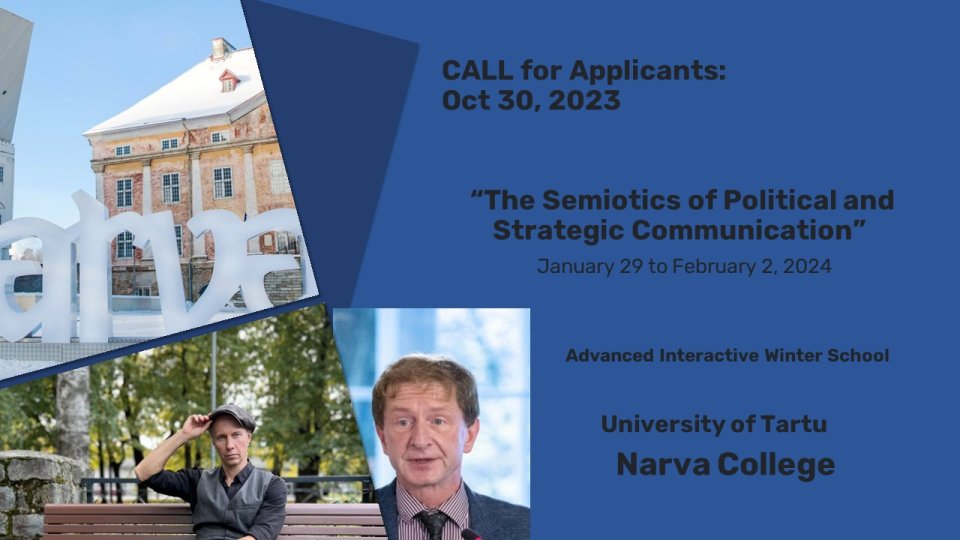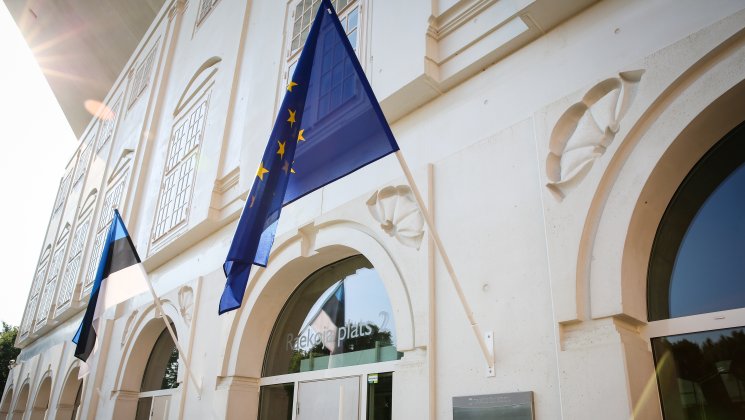Call for Applicants: Oct 30, 2023 “The Semiotics of Political and Strategic Communication” Advanced Interactive Winter School
The Department of Semiotics and the Johan Skytte Institute of Political Studies at the University of Tartu invite graduate and doctoral students to apply for the advanced winter school “The Semiotics of Political and Strategic Communication” 4 ECTS by October 30, 2023.
PLACE
Narva and Tartu in Estonia, at the UT Narva College and the University of Tartu.
TIME
29th January to 2nd February 2024
CONTENT
The winter school is intended to explore from the perspective of political semiotics and international relations the role of strategic narratives and communication in the new geopolitical and security landscape in Eastern Europe shaped by Russia’s war against Ukraine that started on February 24, 2022. The school offers a series of interactive classes, lectures and panel discussions focusing on various components of strategic narratives as discursive and semiotic constructs.
The focal point of the school is new vocabularies, discourses and imaginaries of politics that have appeared after - and were produced by - the Russian full-scale invasion of Ukraine. The topics to be discussed include the repercussions of Russia's aggression for new narratives and images of security and insecurity, the affective potential of discourses and their dislocations. The school program is designed to cover and problematize the ongoing political dynamics in Ukraine in conjunction with countries located at Europe’s eastern flank, including Estonia.
Classes, seminars, and workshops are aimed for both empirical analysis of the war in Ukraine, and developing and testing conceptual approaches and frames to be used as explanatory tools of domestic changes and their international reverberations. Students will have a chance to practice their skills in scenario planning, teamwork and co-authorship in producing and disseminating texts, and project thinking.
The teaching staff is recruited from the University of Tartu and its European partners. The learning process consists of lectures and interactive classes based on students’ inclusive participation, topical presentations and group-based debate. Awareness of empirical facts and the ability to critically engage in profound discussions on the current political situation are highly encouraged. The School program includes evening film screenings and the ensuing discussions.
The working language is English. Participation is equal to 4 ECTS credits, which will be confirmed by a certificate awarded to each student upon successful completion of the School.
TENTATIVE TOPICS / CLUSTERS
Day 1: Semiotics Aspects of Strategic Narratives: Fake News, Conspiracy Theories, Manipulative Techniques of Misinformation
Day 2: Historical Narratives and Collective Memories
Day 3: Strategic Narratives and Human Bodies: How Biopolitics Transforms into Necropolitics
Day 4: Ukraine in the Limelight: What and How Can We Learn?
Day 5: “The Arts of Survival”: Estonian Cultural Narratives in Insecure Times
VENUE
The venue of the School is the Narva College of the University of Tartu in border city Narva where European and Russian cultures blend. The organizers provide comfortable accommodation, free Internet access, and various outdoor opportunities. The end of the last day of the School takes place in the premises of the University of Tartu in Tartu, the host city of the European Capital of Culture 2024. Visiting Tartu is optional for students and will take place after the School teaching program in Narva.
COSTS
The organizers will cover accommodation and meal costs, while participants are expected to arrange and cover their travel to and from Narva by themselves.

HOW TO APPLY
M.A. and Ph.D. students interested in participating in the winter school are invited to submit their:
- CV
- Motivation letter (2 pages) explaining their interest in the topic and its relevance for the applicant’s current studies as well as future career.
- Certificate from their home institution, confirming their student status and level. Not needed from the applicants from the University of Tartu!
Applications documents should be sent both to: andrey.makarychev@ut.ee and andreas.ventsel@ut.ee with the subject line: Application to the Winter School 2024
The deadline for submission is October 30, 2023.
All applicants will be informed by the results of the application for November 15, 2023 via e-mail.
The school is part of the project “Relational Approaches to Strategic Historical Narratives” supported by the Estonian Research Council, and a project “Contested Heritage” supported by the CELSA consortium.
VISA
In case a student is a citizen of an EU country, the US or Canada, no entry visa is required to enter Estonia. There are many other countries whose citizens do not need an entry visa. If you are not certain whether you need a (multiple) short-term Schengen visa, please check the official page of foreign affairs.
Send us your documents to apply for the winter school and indicate that you need to apply for the visa as well.
NB! Before you apply for the visa, be sure to have a valid travel document which is issued within previous 10 years, contains at least two blank pages for visa(s) and is valid at least 3 months after the expiration date of the visa.
In case your application is accepted by us, the university will issue an official Acceptance Letter which enables you to obtain the visa from the nearest (Estonian) Embassy. Please note that the process of getting a Visa may take more than a month.
In case you need additional information about the procedure, please contact your nearest (Estonian) Embassy.


